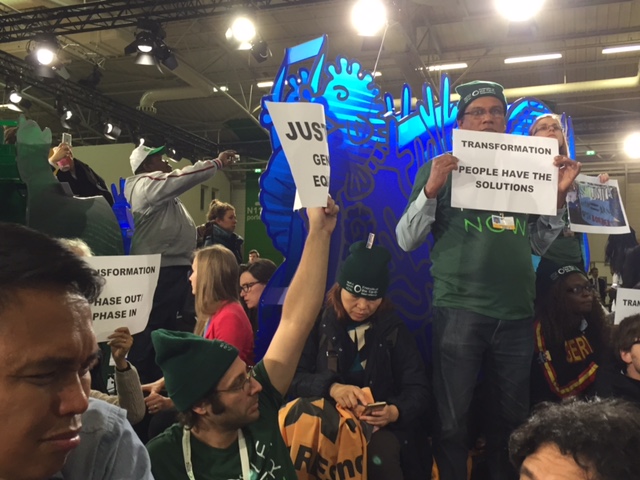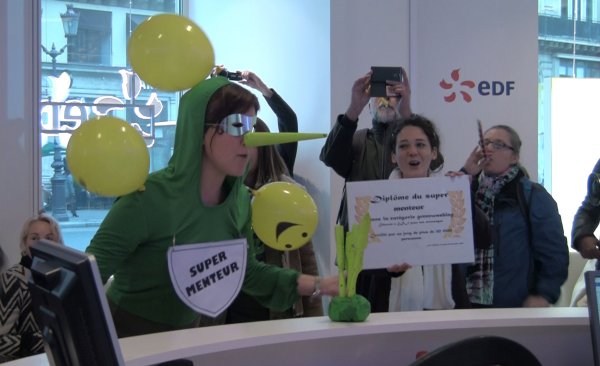
Civil society finally broke through with a loud voice yesterday at the COP 21 global climate summit. For a week-and-a-half, activists and independent energy and environmental groups had been relegated to the sidelines–literally. The only place where anyone could hold anything resembling a protest is on the side of a walkway between exhibit halls, and by application only, for no more than a half-hour. Size of gatherings limited to 35 people. Violate those terms and organizations risked being banned from the COP, and possible future conferences, as well.
Frustrations have been mounting over the insufficient, non-binding terms of the agreement and the inability to break through to the negotiators by applying pressure for more, for a real deal. Activists are here with such a sense of urgency and the knowledge that anything less than a binding agreement to steep emissions reduction is essentially guaranteeing climate catastrophe. And last night, the final language of the agreement was to be decided on by the national delegates. It was expected to largely be a formality. A civil discussion with not much said, quietly closing the book without having gotten done what the world needed world leaders to do to save the planet.
Climate justice groups said enough is enough. They announced that hundreds of people would sit-in at the building housing the government delegations’ offices, before they met to discuss the final draft of the agreement. And we all showed up in force. Confronted with a massive public presence, whether they liked it or not, they agreed to let it happen without police intervention. Nearly 500 of us occupied the building for an hour, demanding climate justice and dramatic action to reduce emissions now. Speeches were Occupy-style, with the crowd amplifying the words of the speakers by repeating their words collectively for all to hear.
Speakers emphasized a vital message to drive home the absolute necessity of a strong binding agreement: “1.5 we MIGHT be able to survive.” Reducing emissions to limit warming 1.5 degrees Celsius (2.9 degrees F) is not an abstract upper limit to how much warming is OK–it is the absolute maximum if large numbers of people on planet Earth are going to have any hope of surviving. We are already most of the way there, at nearly 1 degree Celsius.
The night’s most powerful chant was repeated for 15 minutes:
We are unstoppable!
Another world is possible!
Eventually, everyone marched out of the hall together chanting and stomping out to the giant mockup of the Eiffel Tower outside and continuing to rally while the negotiators began their meeting.

And an interesting thing occurred. A real debate ended up happening last night. Countries that have been willing to push for more did so. From what we heard today, nearly all of the 195 countries’ delegates spoke. Negotiators didn’t get out of there until the wee hours of the morning. It was a virtual ghost town when we showed up again this morning, compared to the usual beehive of activity right from the get-go. Doubtless, the delegates and staff were getting a late start.
The protest was a tremendous show of force by the climate justice activists who have been building for this event. The shadow of the horrific November 13 attacks hangs over this outcome, as well as the French government’s extreme response in stamping out the vibrant atmosphere of protest that was planned and needed to hold global leaders’ feet to the fire. We got a taste of what COP21 could and should have been on Wednesday. We know there are protests happening all over the world this week: it couldn’t be more important for that pressure to come in as loudly as possible from as many places as possible.
As it looks now, the climate agreement is not going to do nearly enough to protect us all from disaster. As far as we know, nuclear is still not in it, but we are not resting on our laurels on that point, either. We are keeping up the pressure until the conference is over and the final agreement is voted on.
Tim Judson
December 11, 2015
Permalink: https://www.nirs.org/we-are-unstoppable/
Your contributions make publication of GreenWorld possible. If you value GreenWorld, please make a tax-deductible donation here and ensure our continued publication. We gratefully appreciate every donation of any size.
Comments are welcome on all GreenWorld posts! Say your piece. Start a discussion. Don’t be shy; this blog is for you.
If you’d like to receive GreenWorld via e-mail, send your name and e-mail address to nirs@nirs.org and we’ll send you an invitation. Note that the invitation will come from a GreenWorld@wordpress.com address and not a nirs.org address, so watch for it. Or just put your e-mail address into the box in the right-hand column.
If you like GreenWorld, help us reach more people. Just use the icons below to “like” our posts and to share them on the various social networking sites you use. And if you don’t like GreenWorld, please let us know that too. Send an e-mail with your comments/complaints/compliments to nirs@nirs.org. Thank you!
GreenWorld is crossposted on tumblr at https://www.tumblr.com/blog/nirsnet




Reblogged this on nuclear-news.
When will the super liar award be given to Germany and Denmark for pretending to have clean energy despite shameful CO2/kWh scores?
Because they don’t deserve it. Transforming one of the world’s largest industrialized economies from one based on nuclear and fossil fuels to one based on clean energy is not an overnight process. Nuclear advocates seem to think that because it hasn’t happened overnight, it has therefore failed. Simply not so. But the reality is that in Germany, renewable generation is way up and nuclear generation is way down. Coal generation is also now down, after a brief rise immediately after the first wave of reactors was closed, and will continue to go down steadily in coming years. The Energiewende is working, and is setting a model for the world. As for Denmark, wind power regularly generates in the 30-40% range and at times has hit 70% and more. And, like Germany, the renewable share of generation will continue to grow, while fossil fuels will continue to fall. Both countries are moving in the right direction. The lie, endlessly repeated by nuclear advocates who fear–for good reason–that their chosen technology has failed and will continue to become less and less important, is that the transformation is failing.